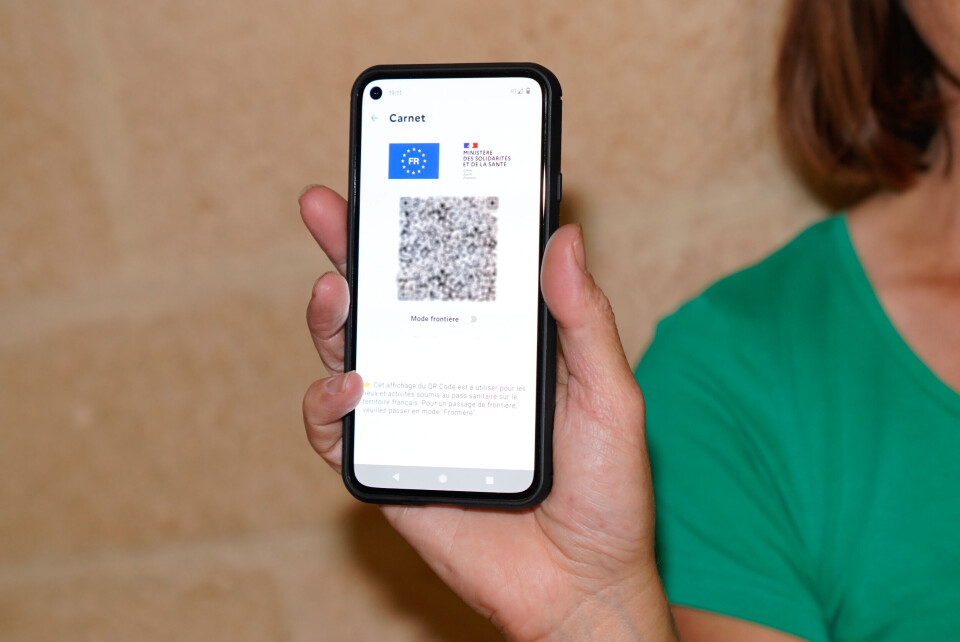-
Roadside noise cameras await approval to start issuing fines for loud vehicles in France
The devices known as meduses already exist in several cities but so far have only been ‘instructional’
-
White storks make strong return in France via nest ‘platforms’ and clipped wings
The Ligue pour la Protection des Oiseaux shares the conservation challenges in saving these birds from extinction
-
Hosting scheme in south-west France lets newcomers sample lifestyle
Households in nine Dordogne communes volunteer under Mes Nouveaux Voisins scheme
Covid: French health pass to continue until at least November 15
Government says there is call for ‘cautious optimism’ despite rising cases in some areas. Scientific advisors recommend a national easing measures by venue type rather than local variations

The Covid health pass will be in use in France until at least November 15, government spokesperson Gabriel Attal confirmed yesterday (October 7).
The decision follows advice from Covid advisory body le Conseil scientifique, which Mr Attal said “called for relative caution”.
“We know that the virus likes winter and the cold weather is coming. We have to remain vigilant,” he added.
However, le Conseil scientifique has advised that rules for using the pass start to be reduced before the end of the year, and suggested that they first be reduced in certain types of spaces, rather than in specific departments.
For example, use of the pass could be stopped on restaurant terraces but maintained for indoor concerts.
But for now, Mr Attal said: “We don’t feel a sense of urgency from people in France to stop use of the pass. They have taken up this tool, which has allowed us to keep many public spaces open.”
Booster doses for healthcare workers
Healthcare workers in France will soon become eligible for booster doses of Covid vaccines, although they will not be obligatory, Mr Attal also said in his announcements.
He added that people who are already eligible for booster doses need to take them.
“Out of 4.5 million eligible people, around 1.5 million have had a booster shot. That is not enough,” he said.
He also confirmed the opening of booster jabs to care workers and other professionals that assist the elderly or vulnerable.
Read more: France extends list of who qualifies for Covid booster jab
The latest report from le Conseil scientifique, released yesterday (October 7), recognised the “success of the vaccination campaign among the general population”, which had limited the impact of the fourth wave of the virus, it said.
The latest figures show that 50,523,678 people have received a first dose of vaccination in France and 48,989,674 are fully vaccinated.
However, le Conseil scientifique said vaccination efforts must continue as “too many people are at risk, specifically people aged over 75 are still not vaccinated”.
It also warned of the risk of new waves of the virus in overseas French territories Martinique and Guadeloupe, where vaccination rates remain “low”.
New Covid treatments expected at end of 2021
Le Conseil scientifique said that new Covid treatments have shown promising results, and could be available for use by the end of the year.
The monoclonal antibody treatments – also known as ‘covid pills’ – have been developed by the Pfizer and Merck laboratories and can be given to people at risk of developing serious forms of the virus as a precautionary measure.
The Conseil scientifique said it would be especially useful to help avoid hospitalisations for people with immunodeficiencies and people whose bodies did not respond to vaccination.
Read more: New American Covid pill not yet submitted for European approval
Masks not needed in primary schools in 21 more departments
From Monday next week (October 11) primary school children under age 12 in an extra 21 departments will not have to wear masks in the classroom.
This is already the case in 47 departments in France.
Read more: Mask rules dropped for primary pupils in further 21 French departments
‘Cautious optimism’ for winter months
Le Conseil scientifique said the health situation has been improving in France since the beginning of September meaning “it was legitimate to ask questions about lifting restriction measures sooner or later”.
However, it added that colder weather and relaxation of barrier gestures may cause circulation of the virus to increase.
Mr Attal added that this was already happening in some departments in France.
He said: “The epidemic is not receding any more, it is picking up very slightly. The situation needs looking at in the Pays de la Loire [region], the Aude department and some other departments.
While daily Covid cases are going down in many regions of France, in Pays de la Loire they have remained stable for some days, hovering around 200 since mid-September, figures from CovidTracker show.
The incidence rate (the number of cases per 100,000 people in the past seven days) is also of concern in some departments.
Nationally, this rate has been falling since mid-August and is currently at 46 – below the alert threshold of 50 – but in some departments, it is creeping up.
In Aude, Occitanie, it is now at 57, and it has also been increasing in Mayenne (57) and Maine-et-Loire (48) in Pays de la Loire.
However, le Conseil scientifique called for “cautious optimism” and said that the high vaccination rate meant it seemed unlikely that “very restrictive measures such as curfew or lockdown” would need to be reintroduced.
It added that maintaining barrier measures such as mask wearing and handwashing would be particularly important over winter.
Related articles
Coronavirus: Daily updates on the situation in France
























